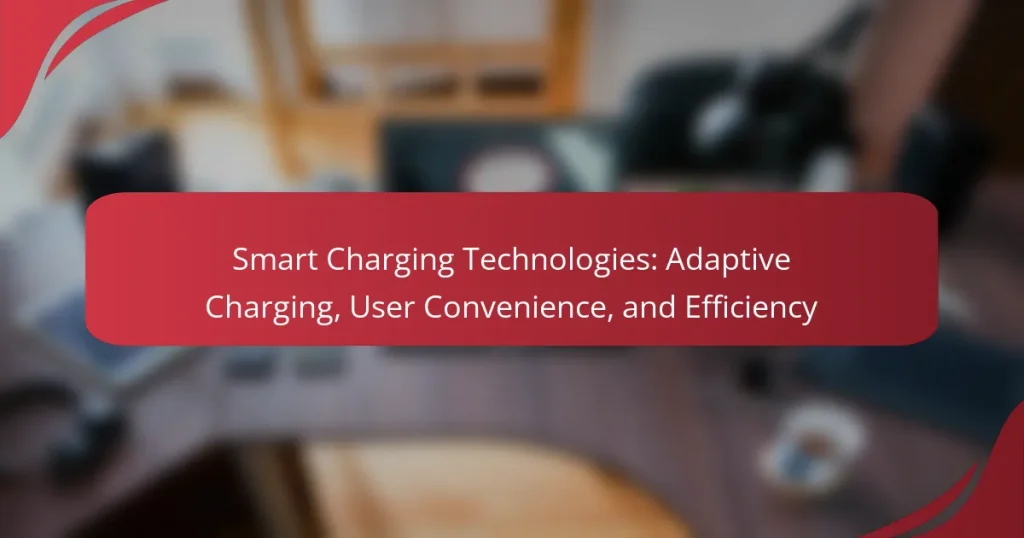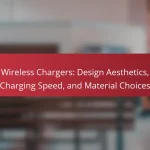Smart charging technologies are systems that enhance the charging process of electric vehicles (EVs) by optimizing energy management and facilitating communication between EVs, charging stations, and the power grid. These technologies adjust charging rates based on energy demand and availability, leading to cost reductions and decreased grid stress during peak times. Adaptive charging further optimizes the charging of electronic devices by adjusting speed based on user habits and battery conditions, which can extend battery life. Key efficiency metrics include energy efficiency, charging speed, and grid impact, with smart charging demonstrating potential reductions in peak demand and improved grid stability. Overall, smart charging technologies significantly enhance user convenience and sustainability in the realm of electric mobility.
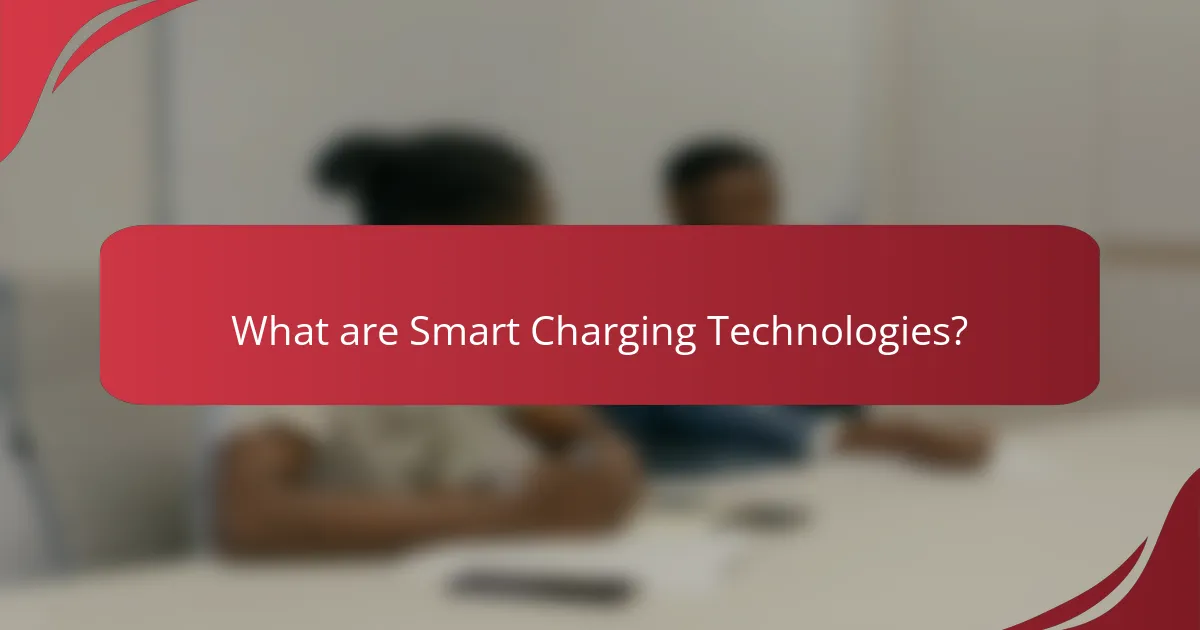
What are Smart Charging Technologies?
Smart charging technologies are systems designed to optimize the charging process of electric vehicles (EVs). These technologies enable efficient energy management and grid integration. They facilitate communication between EVs, charging stations, and the power grid. Smart charging can adjust charging rates based on energy demand and availability. This reduces costs and minimizes grid stress during peak times. For instance, studies show that smart charging can lower energy costs by up to 20%. Additionally, these technologies support renewable energy sources, enhancing sustainability. Overall, smart charging technologies significantly improve user convenience and efficiency in EV charging.
How do Smart Charging Technologies function?
Smart charging technologies function by optimizing the charging process based on user needs and grid conditions. These systems communicate with electric vehicles (EVs) and charging stations. They assess factors such as battery status and electricity demand. Smart charging can adjust the charging rate to prevent grid overload. It can also schedule charging during off-peak hours for cost savings. Additionally, these technologies can integrate renewable energy sources. Studies show that smart charging can reduce energy costs by up to 20%. This efficiency supports a more sustainable energy ecosystem.
What components are essential for Smart Charging Technologies?
Essential components for Smart Charging Technologies include advanced charging stations, communication protocols, and energy management systems. Advanced charging stations provide the infrastructure for electric vehicles to connect and recharge. Communication protocols enable data exchange between vehicles and charging stations, facilitating real-time adjustments. Energy management systems optimize energy distribution and monitor usage patterns. These components work together to enhance efficiency and user convenience in charging processes.
How do these components interact to optimize charging?
Smart charging technologies optimize charging through the interaction of several key components. These components include the charging station, the vehicle’s battery management system, and communication protocols. The charging station regulates power flow based on the battery’s state of charge. The battery management system monitors battery health and temperature. Communication protocols enable real-time data exchange between the vehicle and the charging station. This interaction ensures that charging is efficient and prevents overcharging. Adaptive algorithms adjust charging rates based on user preferences and grid conditions. These optimizations lead to reduced energy costs and improved battery lifespan.
What advantages do Smart Charging Technologies provide?
Smart Charging Technologies offer several advantages, including increased efficiency and user convenience. They optimize energy usage by adjusting charging rates based on demand and grid conditions. This reduces energy costs for users and minimizes strain on the electrical grid. Additionally, smart charging allows for remote monitoring and control, enhancing user experience. Users can schedule charging times to take advantage of lower electricity rates. Studies show that smart charging can lead to a 20-30% reduction in energy costs for electric vehicle owners. Overall, these technologies contribute to a more sustainable energy ecosystem.
How do they enhance user convenience?
Smart charging technologies enhance user convenience by automating the charging process. They adjust charging rates based on user habits and device needs. This ensures devices are charged efficiently without user intervention. Users can schedule charging times to take advantage of lower energy rates. Smart technologies also provide real-time updates on charging status via mobile apps. This allows users to monitor their devices from anywhere. Furthermore, adaptive charging minimizes battery wear by optimizing charge cycles. According to a study by the International Energy Agency, smart charging can reduce energy costs by up to 30%. This combination of automation, efficiency, and cost savings significantly enhances user convenience.
What role do they play in energy efficiency?
Smart charging technologies play a crucial role in energy efficiency by optimizing the charging process for electric vehicles. They adjust charging rates based on grid demand and energy availability. This reduces peak load on the electrical grid, minimizing the need for additional power generation. Smart charging can also utilize renewable energy sources, further enhancing sustainability. Studies show that these technologies can decrease energy consumption by up to 20%. By enabling users to charge during off-peak hours, they help lower electricity costs. Overall, smart charging technologies significantly contribute to a more efficient energy ecosystem.
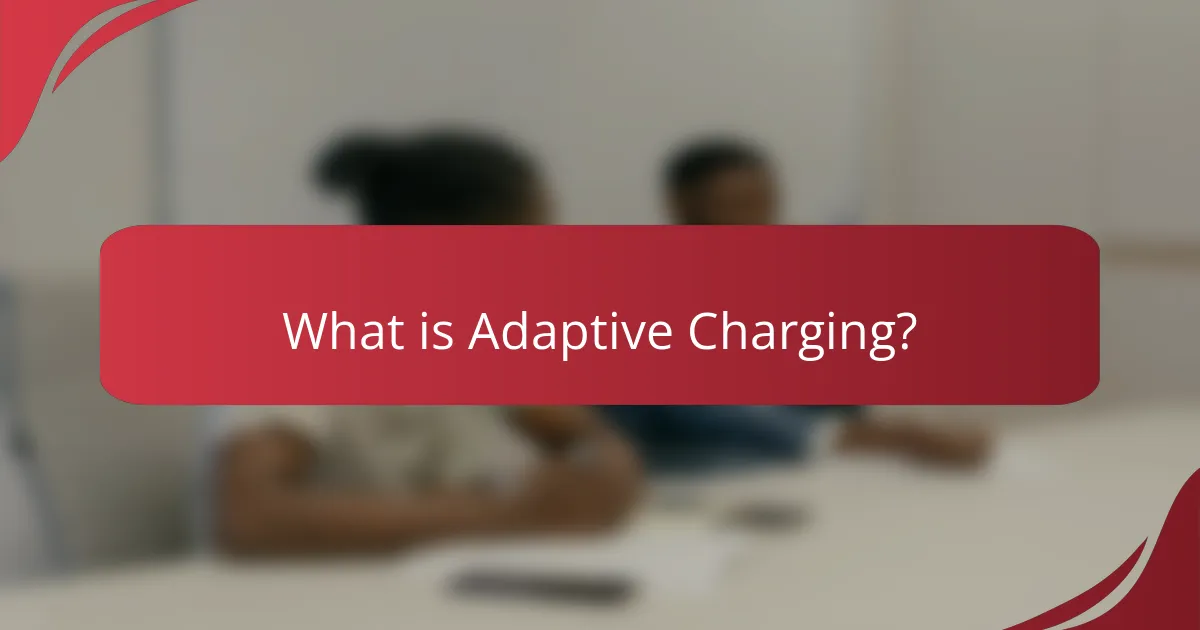
What is Adaptive Charging?
Adaptive Charging is a technology that optimizes the charging process of electronic devices. It adjusts the charging speed and power based on user habits and battery conditions. This method enhances battery longevity and efficiency. For instance, it may slow down charging overnight when the device is plugged in for extended periods. Research shows that adaptive charging can reduce battery wear by up to 30%. This technology is increasingly integrated into smartphones and electric vehicles for improved user convenience.
How does Adaptive Charging differ from traditional charging methods?
Adaptive Charging optimizes the charging process based on user habits and battery health. Traditional charging methods provide a constant current without adjusting to the device’s needs. Adaptive Charging monitors battery temperature and charge cycles to prevent overheating and degradation. It adjusts the charging speed dynamically, ensuring efficient power delivery. This method can extend battery lifespan by minimizing stress on the battery. In contrast, traditional methods can lead to faster battery wear due to constant high voltage. Studies indicate that Adaptive Charging can reduce battery wear by up to 30%. Thus, Adaptive Charging offers a smarter, more efficient alternative to traditional charging methods.
What technologies enable Adaptive Charging?
Adaptive Charging is enabled by several key technologies. These include smart algorithms that analyze charging patterns. They optimize the charging process based on user behavior and energy demand. Communication protocols allow devices to interact with charging stations. These protocols ensure efficient data exchange for real-time adjustments. Battery management systems monitor battery health and performance. They prevent overcharging and extend battery lifespan. Additionally, machine learning enhances the system’s ability to adapt over time. It improves efficiency by predicting future charging needs. Together, these technologies create a responsive charging experience.
How does Adaptive Charging improve battery lifespan?
Adaptive Charging improves battery lifespan by optimizing the charging process based on user habits. It adjusts the charging speed and timing to minimize stress on the battery. This helps prevent overheating and overcharging, which are detrimental to battery health. Studies show that maintaining a battery’s charge between 20% and 80% can significantly extend its lifespan. For instance, a report by Battery University indicates that batteries last longer when charged at a slower rate. By learning user patterns, Adaptive Charging can ensure that batteries are charged efficiently without unnecessary strain. This technology ultimately leads to fewer charge cycles and better overall battery longevity.
Why is User Convenience important in Smart Charging?
User convenience is essential in smart charging because it enhances user experience and promotes wider adoption of electric vehicles. Convenient charging solutions reduce the time and effort required for users to charge their vehicles. Features such as app integration and location-based services streamline the charging process. According to a study by the International Council on Clean Transportation, user-friendly interfaces can increase the frequency of charging events. This ultimately leads to higher satisfaction and confidence in electric vehicle usage. Additionally, convenience factors such as fast charging and easy payment methods are crucial for user retention. As a result, prioritizing user convenience in smart charging systems is vital for the growth of electric mobility.
How do Smart Charging Technologies simplify the user experience?
Smart charging technologies simplify the user experience by automating the charging process. These systems adjust charging rates based on user preferences and grid conditions. They provide real-time data on charging status through mobile apps. Users can schedule charging during off-peak hours to save costs. Smart chargers are compatible with various electric vehicle models. They often include features like remote monitoring and notifications. This reduces the need for manual adjustments and oversight. Studies show that users report higher satisfaction with automated charging solutions.
What features enhance user convenience in Smart Charging?
Smart charging features enhance user convenience through automated scheduling, real-time monitoring, and user-friendly interfaces. Automated scheduling allows users to set charging times based on electricity rates or personal preferences. Real-time monitoring provides users with updates on charging status and energy consumption via mobile apps. User-friendly interfaces simplify the process of initiating and managing charging sessions. Smart charging stations often support multiple payment options, making transactions easy. Additionally, integration with smart home systems allows for seamless operation within existing setups. These features collectively improve the overall user experience by providing flexibility, transparency, and control.
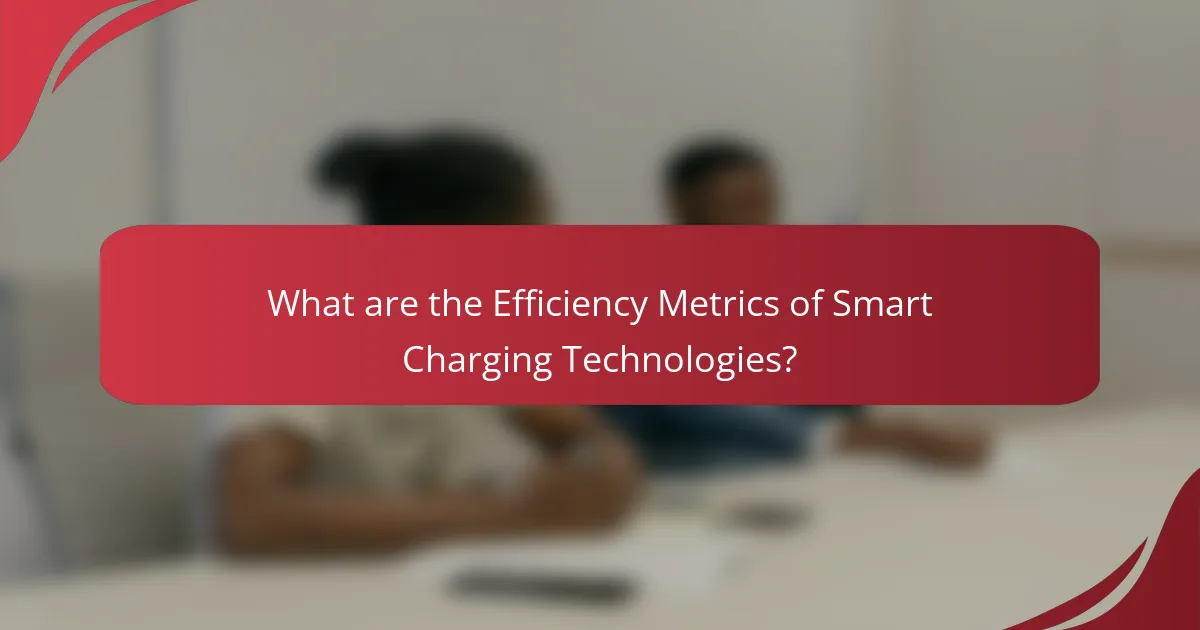
What are the Efficiency Metrics of Smart Charging Technologies?
Efficiency metrics of smart charging technologies include energy efficiency, charging speed, and grid impact. Energy efficiency measures how much energy is used versus how much is delivered to the vehicle. Charging speed refers to the time taken to charge a vehicle to a certain level. Grid impact assesses the technology’s effect on the electricity grid, including demand response capabilities.
For instance, energy efficiency can be quantified as a percentage of energy transferred to the vehicle versus energy consumed from the grid. Charging speed is often categorized into levels, such as Level 1, Level 2, and DC fast charging, with DC fast charging providing the quickest refueling times.
Grid impact is evaluated through metrics like peak load reduction and load shifting potential. Research indicates that smart charging can reduce peak demand by up to 30% in certain scenarios, enhancing overall grid stability. These metrics collectively provide a comprehensive understanding of the effectiveness of smart charging technologies.
How do we measure the efficiency of Smart Charging systems?
Efficiency of Smart Charging systems is measured through several key metrics. These include energy conversion efficiency, which indicates how much energy from the grid is effectively used for charging. Another metric is charging speed, reflecting the time taken to charge a vehicle. Utilization rates measure how often the charging stations are in use compared to their availability.
Grid impact is also assessed, showing how Smart Charging systems affect overall electricity demand and supply. Cost-effectiveness is evaluated by comparing operational costs against the benefits provided.
Data from studies, such as those conducted by the International Energy Agency, illustrate that optimized Smart Charging can reduce energy costs by up to 30%. These metrics collectively provide a comprehensive view of Smart Charging efficiency.
What factors influence the efficiency of Smart Charging?
The efficiency of Smart Charging is influenced by several key factors. These include the charging infrastructure, which must support high power levels and fast communication. The type of electric vehicle (EV) also plays a significant role, as different models have varying battery capacities and charging acceptance rates. Additionally, the state of charge (SoC) of the battery affects charging speed; batteries typically charge faster when they are at a lower SoC.
Weather conditions can impact charging efficiency as well, since extreme temperatures may affect battery performance. The availability of renewable energy sources, such as solar or wind, can enhance efficiency by providing cleaner energy for charging. Demand response strategies that adjust charging times based on grid load can also optimize efficiency. Lastly, user behavior, including charging habits and preferences, influences how effectively Smart Charging systems operate.
How can efficiency be improved in Smart Charging Technologies?
Efficiency in Smart Charging Technologies can be improved through several methods. Optimizing charging algorithms enhances energy distribution during peak and off-peak hours. Implementing real-time data analytics allows for better load management and reduced energy waste. Integrating renewable energy sources can further decrease reliance on non-renewable power. Utilizing vehicle-to-grid (V2G) technology enables bidirectional energy flow, maximizing resource use. Smart charging stations equipped with advanced communication systems ensure compatibility and efficiency. Studies show that these improvements can lead to a 20-30% increase in overall efficiency in charging networks.
What are the best practices for utilizing Smart Charging Technologies?
Best practices for utilizing Smart Charging Technologies include ensuring compatibility with various electric vehicle models. Users should regularly update charging software to access new features. Implementing load management can optimize energy consumption during peak hours. Utilizing renewable energy sources enhances sustainability. Setting charging schedules can reduce costs and improve efficiency. Monitoring charging sessions helps identify issues early. Engaging with user feedback can improve system usability. Finally, educating users about smart charging benefits promotes wider adoption.
How can users maximize the benefits of Smart Charging?
Users can maximize the benefits of Smart Charging by utilizing scheduling features. Scheduling allows users to charge their devices during off-peak hours. This can lead to lower energy costs. Users should also ensure their devices are compatible with Smart Charging technology. Compatibility ensures optimal charging speeds and efficiency.
Monitoring energy usage through apps can provide insights into charging habits. These insights help users adjust their charging schedules for better efficiency. Additionally, users should keep their devices updated with the latest software. Updates can enhance Smart Charging features and performance.
Finally, users can take advantage of incentives offered by energy providers. Many providers offer discounts for using Smart Charging during specific times. This can further reduce costs while maximizing charging benefits.
What common troubleshooting tips should users know?
Check connections to ensure they are secure. Loose cables can disrupt charging. Restart the device to reset any temporary issues. Update software to fix bugs that may affect charging. Use the original charger to avoid compatibility problems. Clean charging ports to remove debris that may block connections. Monitor temperature; overheating can hinder charging efficiency. Test with another device to determine if the issue is with the charger or the device itself.
Smart Charging Technologies are systems that optimize the charging process for electric vehicles (EVs), enhancing energy management and grid integration. This article covers the functioning, essential components, and advantages of smart charging, including its role in user convenience and energy efficiency. It also explores Adaptive Charging, which improves battery lifespan by adjusting charging speeds based on user habits. Key efficiency metrics and best practices for utilizing smart charging technologies are discussed, providing insights on maximizing benefits and troubleshooting common issues.
